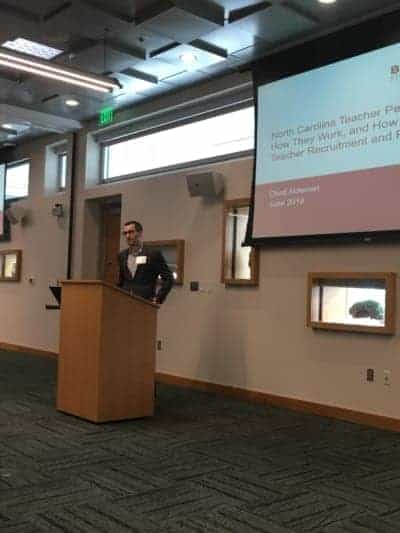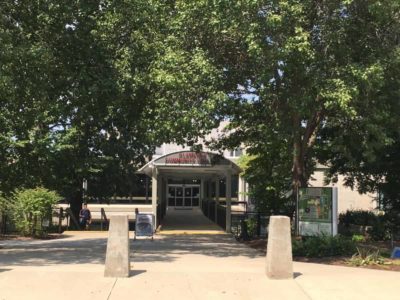

Do pension plans affect teacher recruitment? Essentially, no. That’s according to Chad Aldeman, senior associate partner at Bellwether Education Partners, who discussed the impact that pension plans have on teacher recruitment and retention with North Carolina lawmakers at a recent event hosted by the Hunt Institute. Citing national studies, Aldeman revealed that new teachers generally do not reference pension plans as a reason they decided to pursue teaching. Similarly, they are not sensitive to changes in pension plans to either push or pull them away from teaching or staying in the profession.
However, among veteran teachers, research does suggest pension plans have an influence on their retention in the teaching profession. Once teachers near retirement, they generally stay in the teaching field until they are able to begin drawing benefits from their pension plans.
The problem with this? The majority of teachers do not stick around to enjoy these benefits. Aldeman mentioned that about half of all educators leave the profession within the first five years of being a teacher, and about two-thirds will have left by 15 to 20 years in the field. Of those that make it to retirement, only about 20 to 25% successfully retire and draw from a well-funded pension plan. About half of retired teachers do not qualify to draw any pension at all, and about a third of retired teachers draw reduced benefits, which they typically must supplement through additional family support, working another job, or adjusting to a lower quality retirement in order to make ends meet.


When other states decided to increase pension plan contributions, it did not have an effect on retention rates of teachers. However, Aldeman cautioned that just because it did not have an effect on teacher retention, that does not mean it is unnecessary to increase plan contributions for teachers, citing the benefit of having a retired workforce that is able to support themselves and not rely as heavily on government funded programs.
Interestingly, for North Carolina, spending on pension plans has increased over the years, though that money has not been going directly to teachers. It has generally been spent on unfunded liabilities. In North Carolina, teachers are not given the option if they want to pay into the pension system or not. In some states, teachers are given more flexible plans and have a choice in which type of retirement benefit they want to be contributing to.
For some teachers who enter the profession knowing they will not stay long term, they have no other option but to pay into a pension plan they know they will not benefit from. Aldeman shared national models that create more flexible plans that allow teachers to carry their contributions into their next job. Rep. Pat Hurley, R-Randolph, discussed concern for teachers who would be paying into North Carolina’s pension system to then take that money elsewhere under a more flexible benefit system. Specifically, she asked if a teacher were hired and trained in North Carolina, why should they be allowed to carry the investment the state made in them and move to another state?
Recent changes in other policies directly impacting teachers have created some apprehension over pension plans. With the removal of pay bonuses for teachers with master’s degrees and the freezing of yearly pay increases, some teachers are anxious over changes to their benefits. When asked about this possible apprehension among teachers regarding their retirement benefits in North Carolina, Rep. Joe Queen, D-Haywood, was sympathetic.
“Well, I think out in the field, the teachers and employees of a system worry that something is afoot to change their benefits. They felt everything was hunky-dory and no one was out to screw them but now their trust is not as great because of some of the things that have come down…,” said Queen.
The talk ended with a discussion of how best to provide for veteran teachers aging out of the system while designing policy to be responsive to what younger teachers, and younger professionals in general, see as a more fluid career over their lifetime. Hurley mentioned a lack of visibility in how much teachers are paying into the system and how increasing knowledge of this might help younger teachers recognize the importance of their benefits. For example, if the amount teachers had paid into a pension plan came with their pay stub, perhaps it would help with retention. Queen stressed the importance of having policies that encourage teachers to stay in the profession so that it doesn’t lose its best and brightest.
The legislators thanked the Hunt Institute for bringing them together to think about the future of teacher recruitment and retention in North Carolina. Whether it involves pension plans or not, most seemed to agree on the need to find ways to recruit top teachers and keep them in the system.


